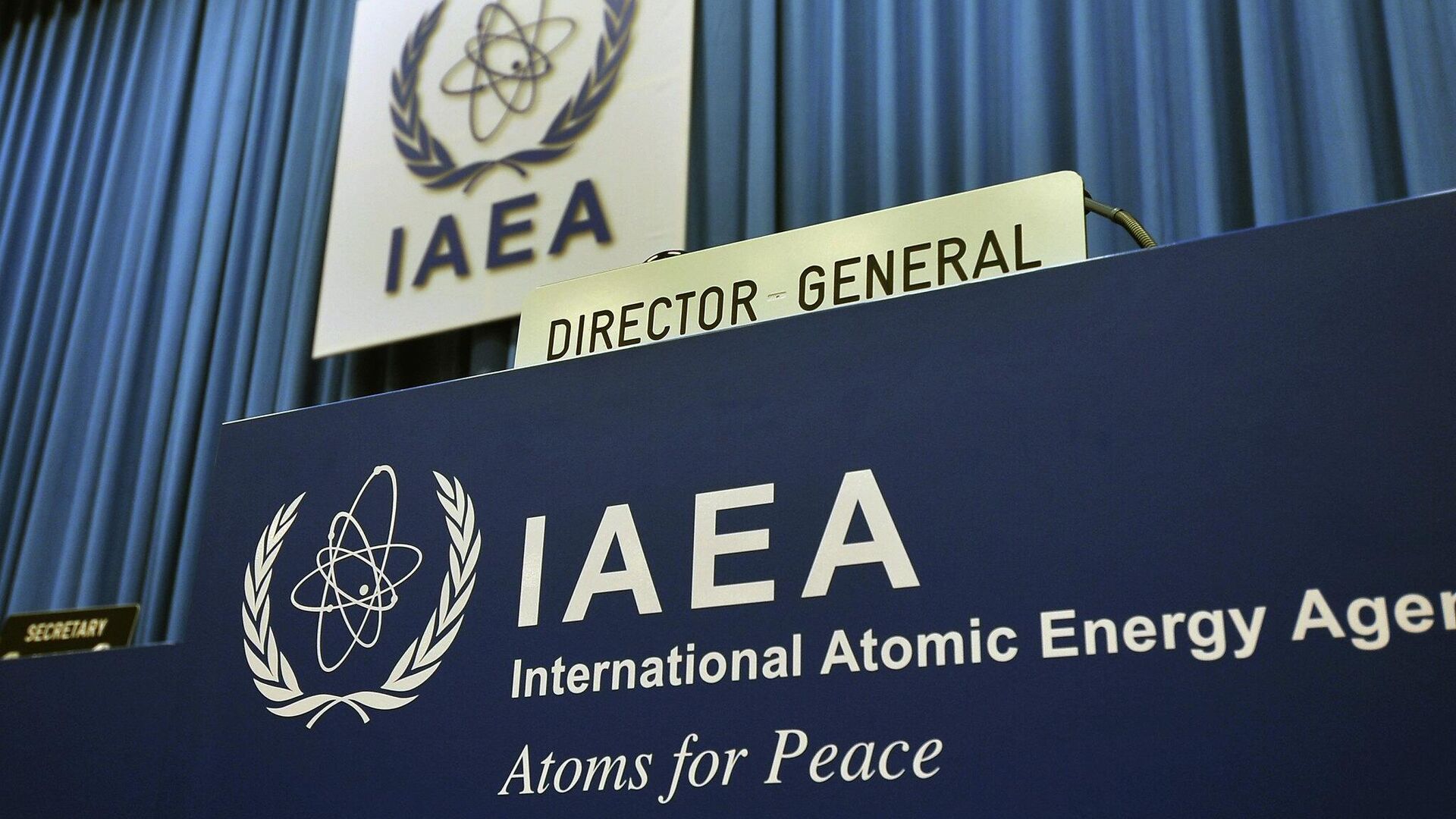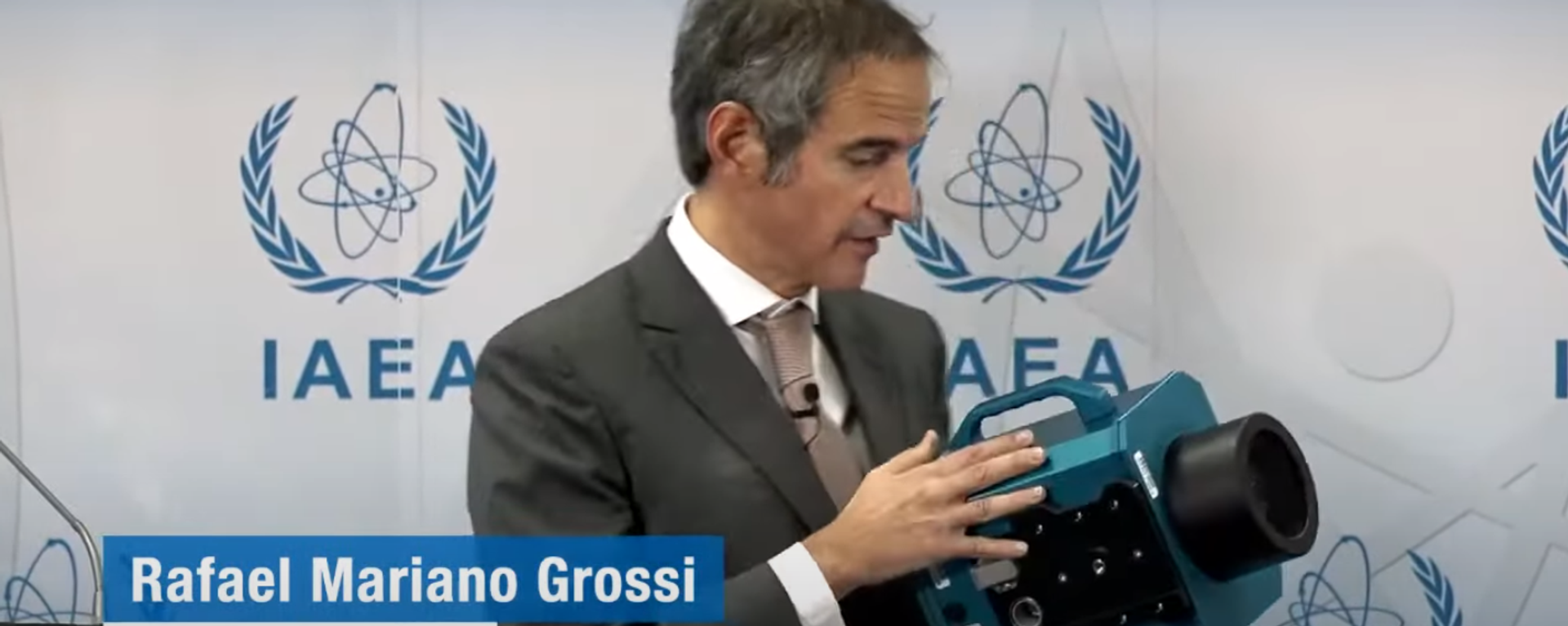https://sputnikglobe.com/20220608/irans-nuclear-agency-turns-off-iaea-cameras-it-says-arent-included-in-march-npt-safeguards-deal-1096133799.html
Iran’s Nuclear Agency Turns Off IAEA Cameras It Says Aren't Included in March NPT Safeguards Deal
Iran’s Nuclear Agency Turns Off IAEA Cameras It Says Aren't Included in March NPT Safeguards Deal
Sputnik International
Following accusations it had refused to cooperate with the International Atomic Energy Association (IAEA), the Atomic Energy Organization of Iran (AEOI)... 08.06.2022, Sputnik International
2022-06-08T19:47+0000
2022-06-08T19:47+0000
2022-06-08T19:47+0000
iran
iaea
cameras
nuclear program
jcpoa
https://cdn1.img.sputnikglobe.com/img/07e6/05/1f/1095897829_0:82:2048:1235_1920x0_80_0_0_c8fb5724b2b0b7fdf47e11d425f8906f.jpg
In a Wednesday statement, the AEOI said the IAEA has “unfortunately ignored the fact that such cooperation signifies Iran’s goodwill, has been ungrateful for the cooperation and has considered it as a duty of Iran,” according to Tasnim News Agency.As a result, the agency turned off two of the ultra-Safeguards Agreement cameras that monitor the country’s enrichment of uranium-235, a radioactive isotope useful in lower purities for nuclear power and at extremely high purities for producing nuclear warheads. It can also be used as the base from which to refine plutonium, a much more powerful nuclear warhead fuel.Speaking before the IAEA’s board of governors on Monday, agency director-general Rafael Grossi said the IAEA had lived up to its end of the March bargain, but that the AEOI had “not provided explanations that are technically credible in relation to the Agency’s findings at three undeclared locations in Iran,” referring to a report the week prior claiming to have found traces of nuclear material there. He demanded Tehran reveal “the current location, or locations, of the nuclear material and/or of the equipment contaminated with nuclear material, that was moved from Turquzabad in 2018.”Iran has also accused Grossi of “colluding” with Israel after he traveled to Tel Aviv on Friday and met with Prime Minister Naftali Bennett ahead of the IAEA meeting. The visit was especially dubious as Israel is not only staunchly opposed to a nuclear deal with Iran, but also possesses nuclear weapons and is not a signatory to the NPT.Separately, the US and the E3 powers (UK, France, and Germany) submitted a resolution to the IAEA board expressing their “deep concern” over Iran’s nuclear program, accusing the country of not cooperating sufficiently with the IAEA to assuage those concerns. Chief among them is that Iran has deployed 2,000 advanced centrifuges and refined some 43 kilograms of enriched uranium with a purity of 60% U-235. The uranium is insufficiently pure to produce a nuclear weapon, but its existence is “fueling distrust as to Iran’s intentions,” Washington said.Iran’s explanation is that it has backed away from commitments made under the 2015 Joint Comprehensive Plan of Action (JCPOA) after the United States unilaterally withdrew from it in 2018 and reimposed crippling economic sanctions against Iran, pressuring its allies into acquiescence. The deal had lowered sanctions against Iran in exchange for Iran accepting strict limits on the quality and quantity of uranium it could produce, allowing just enough to operate a handful of low-purity nuclear power plants.Talks to revive the deal began last year and seemed to be nearly complete by the start of 2022, although little has been said publicly about what remaining differences need to be resolved. However, US President Joe Biden’s refusal to remove Iran’s Islamic Revolutionary Guard Corps (IRGC) from a list of designated terrorist organizations is seen as a major stumbling block. The designation is both questionable to US defense officials and offensive to Iranians, as the paramilitary group is part of the Iranian state and has never been directly implicated in a terrorist attack.However, Khatibzadeh rejected that theory, saying last week that the key issue stalling the JCPOA revival talks in Vienna “included assurances, designated individuals, and Iran’s economic benefit from a possible deal,” according to the state-owned Islamic Republic News Agency.
https://sputnikglobe.com/20220603/iranian-media-accuse-iaea-of-colluding-with-tel-aviv-as-grossi-visits-israel-ahead-of-iran-meeting-1095964606.html
iran
Sputnik International
feedback@sputniknews.com
+74956456601
MIA „Rossiya Segodnya“
2022
Sputnik International
feedback@sputniknews.com
+74956456601
MIA „Rossiya Segodnya“
News
en_EN
Sputnik International
feedback@sputniknews.com
+74956456601
MIA „Rossiya Segodnya“
Sputnik International
feedback@sputniknews.com
+74956456601
MIA „Rossiya Segodnya“
iran, iaea, cameras, nuclear program, jcpoa
iran, iaea, cameras, nuclear program, jcpoa
Iran’s Nuclear Agency Turns Off IAEA Cameras It Says Aren't Included in March NPT Safeguards Deal
Following accusations it had refused to cooperate with the International Atomic Energy Association (IAEA), the Atomic Energy Organization of Iran (AEOI) decided to turn off several monitoring cameras at an unnamed nuclear site, saying they were not part of its monitoring deal with the UN-affiliated watchdog.
In a Wednesday statement, the AEOI said the IAEA has “unfortunately ignored the fact that such cooperation signifies Iran’s goodwill, has been ungrateful for the cooperation and has considered it as a duty of Iran,” according to
Tasnim News Agency.
As a result, the agency turned off two of the ultra-Safeguards Agreement cameras that monitor the country’s enrichment of uranium-235, a radioactive isotope useful in lower purities for nuclear power and at extremely high purities for producing nuclear warheads. It can also be used as the base from which to refine plutonium, a much more powerful nuclear warhead fuel.
The AEOI said the cameras went beyond the scope of Tehran’s nonproliferation treaty (NPT)
safeguards agreement made with the IAEA. It added that more than 80% of the IAEA’s cameras in Iran are covered by the agreement and have remained on.
Speaking before the IAEA’s board of governors on Monday, agency director-general Rafael Grossi said the IAEA had lived up to its end of the March bargain, but that the AEOI had “not provided explanations that are technically credible in relation to the Agency’s findings at three undeclared locations in Iran,” referring to a report the week prior claiming to have found traces of nuclear material there. He demanded Tehran reveal “the current location, or locations, of the nuclear material and/or of the equipment contaminated with nuclear material, that was moved from Turquzabad in 2018.”
Saeed Khatibzadeh, the spokesperson for Iran’s Foreign Ministry,
blasted the report as “neither fair nor balanced,” saying Tehran had in fact provided the IAEA with written answers to its question.
Iran has also
accused Grossi of “colluding” with Israel after he
traveled to Tel Aviv on Friday and met with Prime Minister Naftali Bennett ahead of the IAEA meeting. The visit was especially dubious as Israel is not only staunchly opposed to a nuclear deal with Iran, but also possesses nuclear weapons and is not a signatory to the NPT.
Separately, the US and the E3 powers (UK, France, and Germany)
submitted a resolution to the IAEA board expressing their “deep concern” over Iran’s nuclear program, accusing the country of not cooperating sufficiently with the IAEA to assuage those concerns. Chief among them is that Iran has deployed 2,000 advanced centrifuges and refined some 43 kilograms of enriched uranium with a purity of 60% U-235. The uranium is insufficiently pure to produce a nuclear weapon, but its existence is “fueling distrust as to Iran’s intentions,” Washington said.
Iran’s explanation is that it has backed away from commitments made under the 2015 Joint Comprehensive Plan of Action (JCPOA) after the United States unilaterally withdrew from it in 2018 and reimposed crippling economic sanctions against Iran, pressuring its allies into acquiescence. The deal had lowered sanctions against Iran in exchange for Iran accepting strict limits on the quality and quantity of uranium it could produce, allowing just enough to operate a handful of low-purity nuclear power plants.
Further, Iran has disavowed its past pursuit of nuclear weapons, saying that all weapons of mass destruction are violations of the strictures of Islam.
Talks to
revive the deal began last year and seemed to be nearly complete by the start of 2022, although little has been said publicly about what remaining differences need to be resolved. However, US President
Joe Biden’s refusal to remove Iran’s Islamic Revolutionary Guard Corps (IRGC) from a list of designated terrorist organizations is seen as a major stumbling block. The designation is both
questionable to US defense officials and
offensive to Iranians, as the paramilitary group is part of the Iranian state and has never been directly implicated in a terrorist attack.
However, Khatibzadeh rejected that theory, saying last week that the key issue stalling the JCPOA revival talks in Vienna “included assurances, designated individuals, and Iran’s economic benefit from a possible deal,” according to the state-owned Islamic Republic News Agency.


